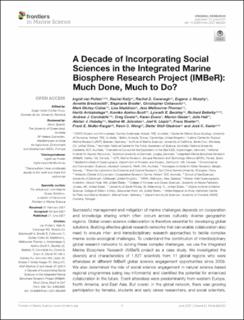| dc.description.abstract | Successful management and mitigation of marine challenges depends on cooperation and knowledge sharing which often occurs across culturally diverse geographic regions. Global ocean science collaboration is therefore essential for developing global solutions. Building effective global research networks that can enable collaboration also need to ensure inter- and transdisciplinary research approaches to tackle complex marine socio-ecological challenges. To understand the contribution of interdisciplinary global research networks to solving these complex challenges, we use the Integrated Marine Biosphere Research (IMBeR) project as a case study. We investigated the diversity and characteristics of 1,827 scientists from 11 global regions who were attendees at different IMBeR global science engagement opportunities since 2009. We also determined the role of social science engagement in natural science based regional programmes (using key informants) and identified the potential for enhanced collaboration in the future. Event attendees were predominantly from western Europe, North America, and East Asia. But overall, in the global network, there was growing participation by females, students and early career researchers, and social scientists, thus assisting in moving toward interdisciplinarity in IMBeR research. The mainly natural science oriented regional programmes showed mixed success in engaging and collaborating with social scientists. This was mostly attributed to the largely natural science (i.e., biological, physical) goals and agendas of the programmes, and the lack of institutional support and push to initiate connections with social science. Recognising that social science research may not be relevant to all the aims and activities of all regional programmes, all researchers however, recognised the (potential) benefits of interdisciplinarity, which included broadening scientists’ understanding and perspectives, developing connections and interlinkages, and making science more useful. Pathways to achieve progress in regional programmes fell into four groups: specific funding, events to come together, within-programme-reflections, and social science champions. Future research programmes should have a strategic plan to be truly interdisciplinary, engaging natural and social sciences, as well as aiding early career professionals to actively engage in such programmes. | en_US |

